H.R. Kemp's Blog, page 3
June 18, 2020
Writing - Fact or Fiction?
Reading is a pleasure during these days of social distancing. I’m an extrovert, so not only do I miss having close contact with my family and friends, I miss spending time sitting in cafes and generally getting out amongst the crowds. Being around people energises me and this setting myself apart makes it hard for me to concentrate and I’m easily distracted. Thank goodness reading helps me escape reality for a while. Or does it?
Over the last few months I've read two interesting and contrasting novels. They started me thinking about how much reality is necessary in a novel, after-all they are fiction. I expect novels to tell stories and to entertain me unlike non-fiction books, biographies, autobiographies, or even memoirs. They may entertain, but they also inform. Yet, time and again, I've heard readers at Adelaide Writers’ week ask authors of fiction if their writing is based on their own lives or true events, as though a story needs to have an element of truth to be valid. This perplexes me. Do we search for truth and reality in our novels?
As most writers do, I research the topics relevant to my plot and try to imbue believability to make it plausible. A recent reviewer told me that my novel, Deadly Secrets, 'sounded very real' and she thought 'something like that could happen in the future' and I took that as a compliment. Yet, my novel is fiction and a product of my imagination. If a novel isn't credible, it's seen as too way out, unreal, and therefore lacking, yet reality has no such restrictions on how incredible it can be.
I recently read two novels, each with a different relationship between fact and fiction and I found the contrast interesting and thought provoking.
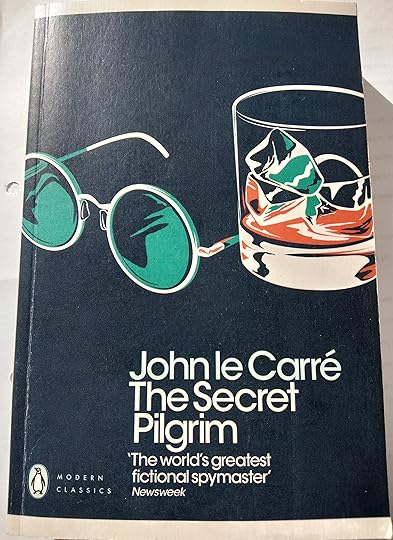
The first novel, is by one of my favourite authors, John le Carré. The Secret Pilgrim is a spy thriller, the eighth ,George Smiley novel and the story consists of a collection of reminiscences. In real life, John le Carré was a secret agent, and his intimate knowledge of that world and the way the organisations, and the people in them, worked, adds a sense of truth and reality. His fiction has credibility and provokes thinking about the world issues of that time and now. That's what I enjoy. The complexities of the issues, the different forces that play out in these stories and the way I can connect to them even now. They still have relevance. I have even taken short quotes from the novel that apply to today's issues (I will use those in my next blog).
In the afterword, John le Carré states very clearly:
Very few characters in my writing are drawn from actual people, and those who are tend to be a mishmash of several. Very few episodes have a basis in fact either…
I enjoy reading le Carré for his multi-layered plots, his very human characters and the important questions it raises for me. Knowing he has orchestrated these things doesn't diminish my enjoyment. Being fiction, I can mull over these stories without feeling the heavy burden of bearing witness to a truth.
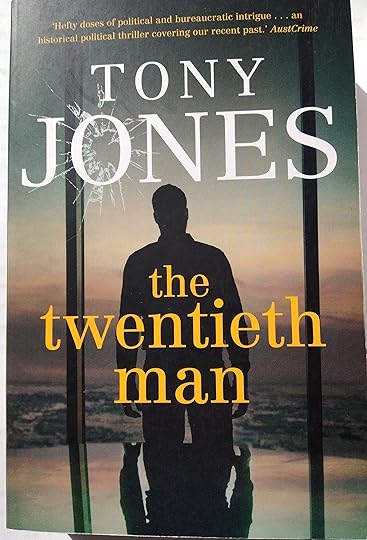
The second novel I read is a very different kind of book. Tony Jones goes to great lengths to emphasise his novel, The Twentieth Man, is fiction. The plot in this historical political thriller, revolves around an actual event that occurred in the 1970s. Some of his characters are real people, who played an actual role in that event. He uses their real names and attributes actions and dialogue to these characters which may or may not be accurate. Tony Jones is a former political journalist, and although he says this novel is fiction, it’s not clear how much we can trust his depiction of the real people he uses in the story.
For me, this blurring of the lines between fact and fantasy is disconcerting. I struggled to read without stopping to question if the real characters would have really said this or done that. It bothered me that people may be misrepresented by this fictional characterisation. It also bothered me that I couldn’t easily separate the truth from Tony Jones’ imagination. Not everyone will have a problem with this, I did. I don't know if this blurring was deliberate or a device to make the story more appealing? I found it spoiled my enjoyment of what was good writing and a thrilling plot.
What do you think? Does blurring fact and fiction bother you in a novel or not?
My novel, Deadly Secrets, is fiction. I research my plot lines to ensure they are plausible. I use real events to build the details within a plot and to help me establish credible scenarios. I draw on real political issues to ask ‘what if’ and project my plot into new dimensions. The characters are not real people. Like John le Carré and other authors, my characters are an amalgamation of personality traits and characteristics that I have encountered over my life time. For me, using a real person as a character would limit what they could do or be.
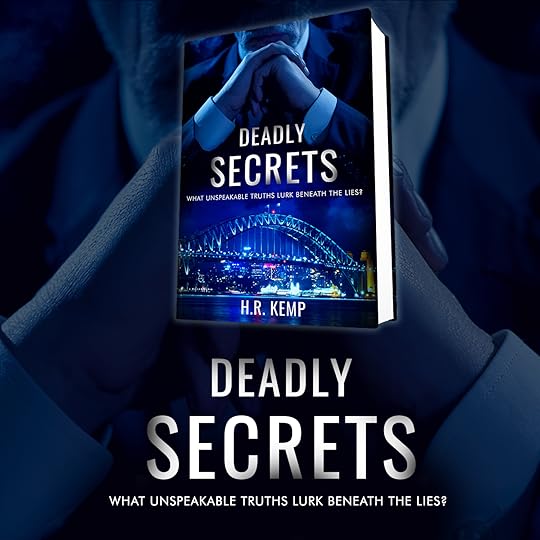
The references I used to research my plot are listed on my website
It's clear to me that the blending of fact and fiction happens in novels on a sliding scale. It isn't a black and white issue. For me, I like credible and thought-provoking stories where the facts form a backdrop, or inform the writing but I don't like to be confused by what is real and what isn't while I'm reading. If I want facts, I read non-fiction.
I hope you all stay safe and well. Until next time.
If you'd like to read Deadly Secrets you can use the following links to buy it in either eBook or paperback.
You can purchase Deadly Secrets here:Amazon ,,(eBook and paperback):
Australia
UK
USA
,eBook only
Also available in eBook from:
Apple, Barnes & Noble (Nook), and Tolino
Also available in paperback from:
Writing, Uncomfortable Questions

The current situation requires social-distancing and self-isolation which has been challenging. Keeping socially distant from my family and friends feels unnatural and hard, but at least I live in relative comfort. We moved to this home 6 years ago and I can go for walks along the beach, get takeaway coffee from our regular coffee shop and even call for takeaway meals to be delivered from our favourite dine-in cafes. The loss of social connection is the hardest thing, not being able to hug my grandchildren or enjoy a meal with my grown-up children. Technology fills the breach, but it doesn’t replace the close contact I yearn for.
We are lucky though. Our supermarkets are still well-stocked (except maybe toilet paper), and my fridge, freezer and cupboards have enough good food to keep us going for some time. We might not have everything we want, but we definitely have everything we need.
While on one of my early morning walks, I started to think about the plight of those in poorer countries, families confined to one room, with no fridge and no income. It's difficult to imagine what that would be like and how frightening this pandemic is to those with limited access to healthcare.
Then my thoughts turned to another family, who are currently in imposed isolation. I don’t know them but I know of them. The mother, father and two children have lived in Australia for a number of years. The Tamil mother and father, each, individually, fled their homes in Sri Lanka, escaping a life-threatening political situation. While striving for a safe haven, they met, fell in love and married. They established a small family unit, gaining stability and safety for themselves and eventually for their two daughters (both born in Australia).
This family moved to Biloela, a small country town in Queensland, where the community welcomed them. The parents found work at the local Abattoirs (which has difficulty attracting workers) and the family became part of the fabric of the small town community.
In 2018, in the early hours one morning, border force officers burst into their Queensland home, awaking the family with a start. Officers held the terrified, crying children back as the parents scrambled to gather whatever possessions they could in the 10 minutes they were given. The family was transported to a Melbourne detention centre. In 2019 a court injunction stopped their deportation mid-air, and they were transferred to Christmas Island far from advocates, lawyers, healthcare, friends and supporters. They are still there.
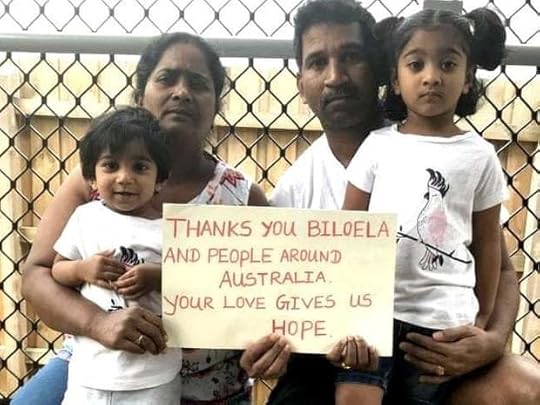
This is of Priya, her husband Nadesalingam and their daughters Kopika (4) and Tharunicaa (2) from the Guardian 26/1 /20
https://www.theguardian.com/australia...
The local community protests have fallen on deaf ears and the Australia-wide protests and lobbying of the government has failed to bring this family back. (Unlike the phone calls that allowed foreign au-pairs to stay despite having the wrong paperwork, this family is paying dearly for being late with theirs). They are law-abiding, hard-working people and are supported by their community. The image of armed border-force officers (in black uniforms, weapons and protective gear) terrorising the children and further terrorising already traumatised adults, makes me shiver. I can’t believe the images are from this country, this democracy.
Recently I watched the TV series Stateless, which is based on true events, and I feel despair. Those on temporary protection visas are assessed to be legitimate refugees yet we are determined to not allow them to settle and make their home here. For those who argue the cost of taking in refugees is too great, the facts are sobering. The Government spent $26.8m in reopening this Christmas Island centre (Feb 2019) and it houses 4 people with 109 guards to oversee their detention. In October 2019 the government granted a 3 year $20m contract to a mining company to maintain this detention centre. These dollar amounts shock and dismay me.
If you are struggling with social distancing or self-isolation, then spare a thought for this family, and for those trapped on Nauru indefinitely. They have no time frame for their freedom, despite not being guilty of any crime, tried by any court, or sentenced by any judge. Seeking asylum is not illegal.
My writing is often draws on wider issues and dilemmas. My Short stories focus on personal and human situations. Deadly Secrets builds on that by examining ,uncomfortable questions about politics and government policies through fiction.
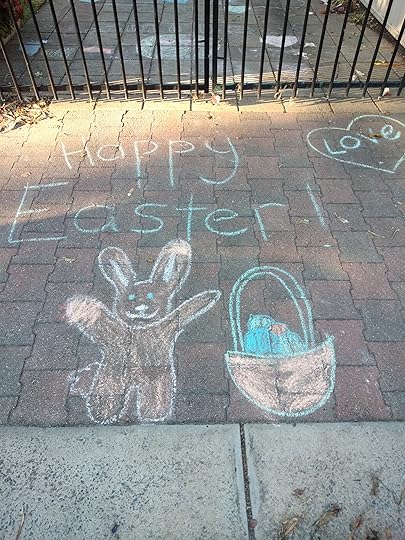
This Easter, when people are thinking about church services they will miss, Easter egg hunts that won’t happen and family gatherings that are being postponed, perhaps we could also think about how we can restore a sense of compassion and care for those more vulnerable and in need of our help.
June 17, 2020
Writing - World Issues
Many books make me reflect on life in our broader society and give me food for thought. They make me ask questions and although, our politicians generally offer simple solutions (sometimes packaged as three word slogans), life is more complicated than that and the issues we are dealing with as a society cannot be resolved without deeper thought, drawing on expertise and being willing to apply solutions that are not always popular. As we begin our return to BC (before Covid) life, I am hoping for a better normal, not just a return to what we had.
Personally, I’ve been appalled to see communities around the world split into warring tribes. Allegiance to political parties, for some, borders on worship and they remain loyal even when those they follow lie and cheat. Often the excuse is ‘they all lie,’ but to me, continuing to support those who are dishonest, who abuse their power and who take advantage of the vulnerable, is tantamount to condoning their behaviour.
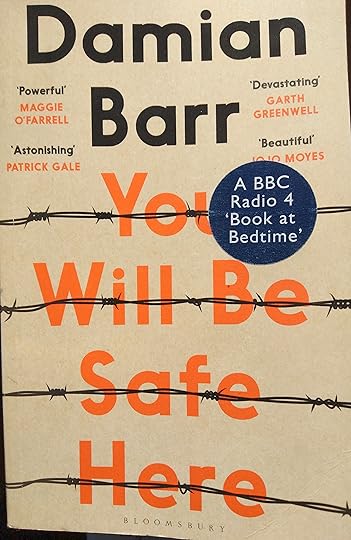
One of my recent reads lay bare the dehumanisation and cruelty of the ‘us and them’ mentality. ‘You will be safe here’ by Damian Barr is a disturbing novel set in South Africa with one story line from the height of the second Boer War (1901) and a second story line from 2010. (The story lines are linked but I won’t reveal any spoilers here). These stories form uncomfortable histories. The depiction of the cruel treatment of Boers in the British concentration camps was disturbing and heart-rending. I’m amazed that we appear to have learnt nothing from these events that reoccur through history. Pointing the finger at people, denouncing them as ‘the other,’ is too often used as justification for mistreatment and labelling people as less than human.
Reading this novel wasn't so much about entertainment in the traditional way but a way to explore ideas and concepts. It made me think and I hope it also helped me to understand.
Fiction can provide a safe space for thinking, challenging and questioning. Reading fiction can also be an escape, a way to avoid thinking about the unpleasant issues of life. For me, despite the temptation to be drawn into a cocoon of pleasant worlds, I am not satisfied to let that be the only reward for reading. It serves a purpose at times, but I want the world to be a better place and that can only happen if I pay attention, challenge, ask questions and think more deeply.
A quote from John le Carre’s ‘The Secret Pilgrim’ seems to echo the current political environment.
“…we sacrificed our compassion to the great god of indifference. We protected the strong against the weak, and we preferred the art of the public lie. We made enemies of decent reformers and friends of the most disgusting potentates. And we scarcely paused to ask ourselves how much longer we could defend our society by these means and remain a society worth defending.”
The novel is set in the period after the cold war but disappointingly, I find many of the observations in that novel relevant in today’s world.
Fictional stories are often built on research and fact. They can highlight issues that are real and need attention but sometimes we need to turn to non-fiction.
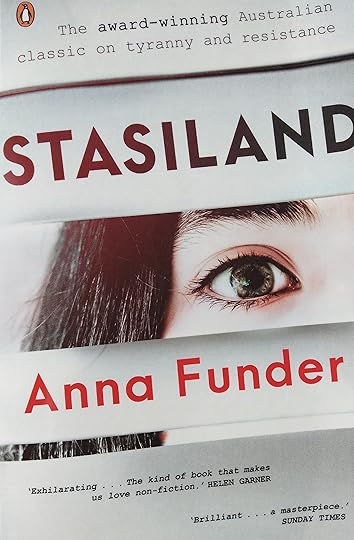
I read non-fiction from time to time, mainly for research but sometimes also for interest. I read ‘Stasiland’ by Anna Funder many years ago and it left a lasting impression. It is a classic book. The portrait of the surveillance state of former East Germany is chilling. It draws on interviews with both those spied on and those doing the spying. It’s frightening to read how some still hold an absolute belief in the system regardless of the overwhelming evidence of its dreadful harm. It’s scary hearing Anna Funder say many of these issues still need to be addressed. I highly recommend this book. These are issues that should never be forgotten.
In our current times, it is easy to want to turn away from politics. It’s depressing and upsetting to watch the political manoeuvring. Some say it’s ‘not my problem’ but I disagree. It is everyone’s problem. Politics decides the kind of society we live in. It decides what we value and what we care about. If we care about standards, then we need to ensure we make those who act for us, uphold them. This requires paying attention and being willing to make a stand.
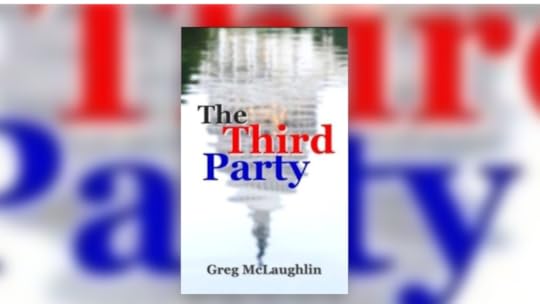
'The Third Party' by Greg McLaughlin is a different kind of political fiction, one that shows an honourable politician trying to make a difference from within a highly charged political system. It is an interesting story of the behind the scenes machinations, but also the story of a man of integrity who struggles to stay true to his principles while working within politics.
My review said:
,Greg McLaughlin has written a terrific story with stunning characters and a plot that keeps you turning the page. This well-written novel is steeped in action and perfect pacing. The plot kept me intrigued and reading to the end and the conclusion was satisfying and rewarding.
,It is unusual to have principled politicians. Who knew a writer could create a politician that I would be cheering for?
Everyone has a choice in life. We can choose to sleepwalk through issues, turn a blind eye to inequity and abuse of power or we can choose to object and stand up for principles. It’s the challenge I set the characters in my political thriller, Deadly Secrets. Ordinary characters are faced with extraordinary circumstances, they're posed some hard questions. The story follows their wrestling with difficult options. Do they stay true to their own principles or do they walk away? The question is: Can ordinary people thwart a powerful conspiracy? Read Deadly Secrets to find out.
,I hope you all stay safe and well. Until next time.
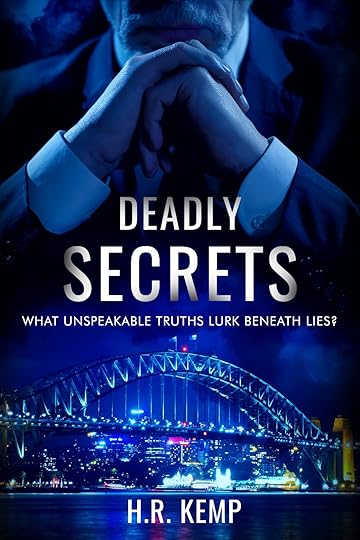
Visit my website
Deadly Secrets is available in paperback and eBook from:
Both eBook and paperback:
Australia
UK
USA
eBook only:
Apple, Barnes & Noble (Nook), and Tolino
Paperback also available from:
Another step towards release
Deadly Secrets is being prepared for going out into the world. I'm grateful for the professional help of Amanda from Let's Get Booked, who is ensuring it is the best it can be The manuscript has been thoroughly edited and formatted and the complete cover (front, back and spine) is imminent. Yet, there are still many decisions that need to be made as I work toward the release date of 31 March.
I want Deadly Secrets to be available in both eBook and paperback formats. I personally still love reading a 'real' book and like the feel of it in my hands. I've read novels on-line and I understand how convenient it is, but a paperback is still my preferred option. I seem to engage with the story more and retain the details better. That's me though, and it may not be the same for everyone.
If you're a thriller reader let me know if you prefer eBooks or paperback.
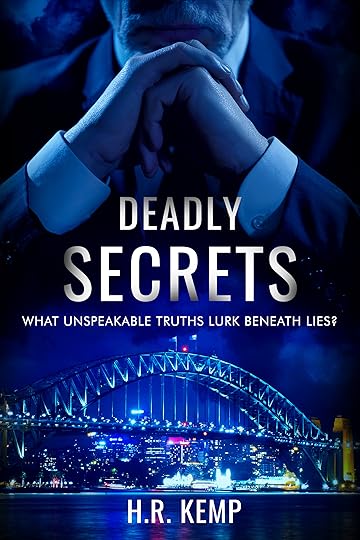
Deadly Secrets is a big book (98,000 words), so choosing a trim size (actual dimensions of a paperback) is significant. (My current choice makes the novel 488 pages long). I'm not a fan of the large paperback format preferred by publishers at the moment, how do you fit it into a bag? But, printers and distributors work from different sizes, which makes choosing even more complicated.
Do you prefer the large format or do you like your novels in the smaller format? I'd love to hear what you think.
I also prefer a font size that's easy to read. Of course, since needing to wear reading glasses, I'm more conscious of the size of the print in novels (and on labels, food packaging, and in documents and so on). Recently I opened an old book of short stories and needed a magnifying glass to read the tiny print. I guess, that's one problem e-readers don't have.
I don't know if anyone still likes large print options for books, but I'd be interested if that's something I should consider. Let me know if you'd like that option.
For print copies, even the type of paper (creme rather than white) and the finish on the cover (Gloss or Matt) have been interesting to research. I'd never looked at a novel that closely before, and hadn't really noticed the difference.
Do you have preferences?
My next step is to work out how to distribute both eBooks and paperbacks. Amazon has a big reach but there are many other channels that could give more readers access to my story. It's been confusing, interesting and enlightening, checking out the options and trying to decide what's best. This is where Facebook really helps. Being a member of several Facebook reading and author groups, meant advice was close to hand. Thank you to those who willingly shared their experience and knowledge. The author community has good support networks.
Of course, now, while the final touches are being put in place, I need to think about promotion and marketing. These require a whole new skill set from writing a novel. How do I ensure those who would enjoy my novel, find out about it? Especially when there are so many novels out there already. I'm still learning and it's probably the subject for another blog.
As a start, if you'd enjoy a thriller with a difference and would like to get updates, news, and early bird specials, then you can
April 4, 2020
Write, Time to Think
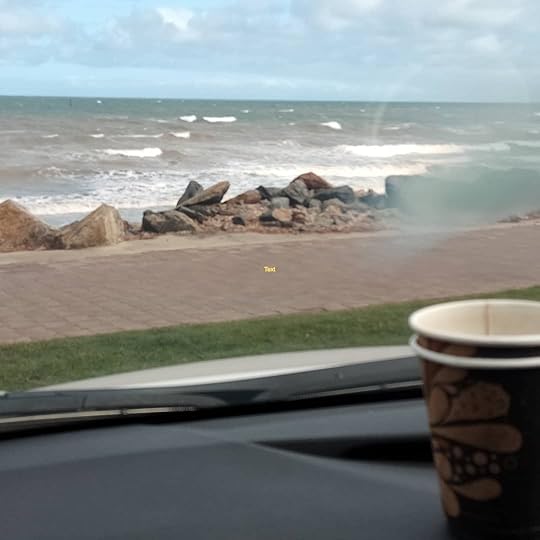
What strange times we live in. People around the world in different stages of social-distancing, self-isolation and lock down. It's depressing to see the human toll daily. With such enormous issues to deal with, it's hard to think about launching a novel.
,Publishing my novel has been a welcome distraction for me. Something to look forward to and feel a sense of excitement about. When the first boxes of paperbacks arrived, it gave me a thrill despite not being able to distribute them as I had planned. Two bookshops in Adelaide accepted books for their stock, and I'm grateful that they still could. Both Dymocks, Glenelg, and Matilda Bookshop, Stirling, have my novel on their shelves and they have adjusted their mode of operation to offer delivery to locals. They are trying to do what they can to get through this.
Living in Australia, we are practising social distancing and pubs, clubs, restaurants, and cafes are closed for dining in. We are now having takeaway coffee sitting in the car instead of a coffee or two in the cafe. It's been a good time to think (although, I'd argue it's never a bad time to think). Many talk of reviewing their lives and their priorities, to reevaluate what's important. I hope our society comes out of this pandemic stronger and better, but I fear that we will not. Even now, the focus of politicians and news is more on the economic rather than human cost.
Prior to this our health systems, public housing, disability support, aged care facilities and so many more public responsibilities suffered from under-funding. We are now learning how important they are. Yet, when we emerge from this crisis, I am afraid that these same areas will bear the brunt of recovery. Will we still focus on climate change action? Will we remember the scourge of inequality that needed to be address even before the pandemic? Or will we accept the ,excuse of the damaged economy to allow a lack of action. In Australia, will we remember the sports rort, or the mess of the Murray Darling Basin plan, with communities without water for months, or the fire risk due to drought? Or will we simply forget and move on. I've seen it before. Big issues, big scandals, and yet they are pushed into the background by the immediate concerns.
I would like a better democracy, one that doesn't leave people behind, that makes the Banks answerable for their actions, that stops the exploitative practice of wage theft and that truly acts to make life better for all. But to achieve that we will all need to pay attention and not be distracted by the talk of money and costs.
We've seen the best and the worst during this time. We've seen the panic buying, with supermarket shelves stripped of toilet paper, and we've seen groups band together to deliver food to the vulnerable. We've seen organisations (who in good times demand 110% from their employees) sack their staff without concern for their welfare while there are examples of organisations valuing their people and being innovative in the way they approach their new business circumstances. We've seen governments that act decisively and strongly to protect their people and we've seen denialism (just like the climate denialism) that refuses to acknowledge the science and the facts. We should remember those who do the right thing and ensure they are rewarded when this is over.
In the meantime, I will do whatever is required to stay as safe and well as possible and I hope that you will too. Take care.
Perhaps, if you are looking for a distraction or something to pass the time, and you enjoy reading political thrillers, you might give my novel a try.
It's available in both eBook and Paperback and I've added the links below for your convenience.
Amazon in eBook & Paperback
Australia
UK
USA
,The eBook is also available from
Apple, Barnes and Noble (Nook), and Tolino
Kobo:
,The paperback is also available from
Fishpond - Australia
https://www.fishpond.com.au/q/Deadly+Secrets.+What+unspeakable+truths+lurk+beneath+the+lies%3F
Barnes and Noble




